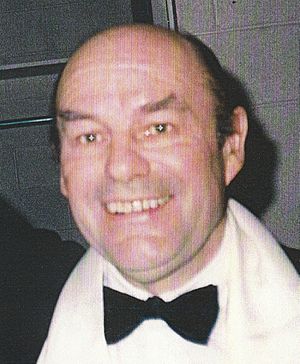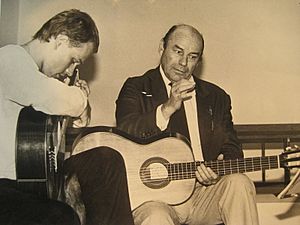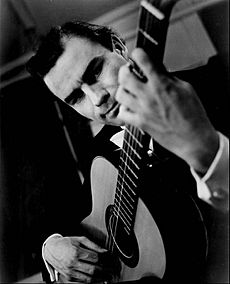Julian Bream facts for kids
Quick facts for kids
Julian Bream
|
|
|---|---|

Bream in 1989
|
|
| Background information | |
| Birth name | Julian Alexander Bream |
| Born | 15 July 1933 Battersea, London, England |
| Died | 14 August 2020 (aged 87) Donhead St Andrew, Wiltshire, England |
| Genres | Classical |
| Occupation(s) | Musician |
| Instruments | |
| Labels |
|
| Associated acts | (1) past_member_of The Julian Bream Consort/ Julian Bream and John Willams |
Julian Bream (born July 15, 1933, died August 14, 2020) was a famous English musician. He was a master of the classical guitar and the lute. Many people consider him one of the best classical guitarists of the 20th century. He helped make the classical guitar a respected instrument. Julian Bream also brought back interest in the lute, an older string instrument. His career lasted for more than 50 years.
Contents
Growing Up as a Musician
Julian Bream was born in Battersea, London, England. His family moved to Hampton, London, when he was two years old. He grew up in a very musical home. His father was an artist and played jazz guitar. He couldn't read music but had a great ear for it.
Julian started playing his father's jazz guitar when he was very young. He learned by playing along to dance music on the radio. His father taught him the basics. Later, Boris Perott, the president of the Philharmonic Society of Guitarists, gave Julian more lessons. Julian also had access to many rare music pieces through his father's job as the society's librarian.
On his 11th birthday, Julian received a small Spanish guitar from his father. He quickly became a child prodigy. At age 12, he won an award for his piano playing. This allowed him to study piano and composition at the Royal College of Music. He gave his first guitar concert in Cheltenham on February 17, 1947, when he was 13. In 1951, he performed at Wigmore Hall in London for the first time.
Julian's father worried about him becoming a classical guitarist. He thought it would be hard to make a living unless Julian played jazz. But his father's words made Julian even more determined to become a professional classical guitarist. Julian brought his guitar to his Royal College of Music audition, even though they didn't teach guitar there. The college accepted him but told him not to bring his guitar. Julian still brought it for late-night practice. When the school found out, they asked him to leave his guitar at home again. Julian decided to leave the college instead.
In 1952, Julian had to join the army for national service. He was first put into the Pay Corps, but after six months, he joined the Royal Artillery Band. This allowed him to be stationed in Woolwich, near London. He could still play his guitar in London regularly during this time.
A Career Around the World
After three and a half years in the army, Julian took any music jobs he could find. He played background music for radio shows and movies. Recording music and working for the BBC were very important to him in the 1950s and early 1960s. In 1952, he played the lute in a concert at the Wigmore Hall.
Julian Bream had a very busy career, performing all over the world. His first tours in Europe were in 1954 and 1955. Starting in 1958, he toured extensively in Asia, India, Australia, and many other places. His first tour in North America was in 1959.
In 1960, he formed the Julian Bream Consort. This group played old instruments, with Bream playing the lute. The Consort helped bring back a lot of interest in music from the Elizabethan era (the time of Queen Elizabeth I). In 1963, Bream performed with his Consort in Boston, USA, for the first time. Besides performing, Bream also taught master classes and at a music summer school.
Later Years and Achievements

In 1984, Julian Bream seriously hurt his right arm in a car accident. But he continued to perform.
In 1991, the BBC broadcast his performance of Malcolm Arnold's Guitar Concerto. He also played works by Toru Takemitsu at the Japan Festival in London.
In 1992 and 1993, he performed twice at the Wigmore Hall. One concert celebrated his 60th birthday. During this time, he also toured Asia. He played the first performance of a new arrangement of Albéniz's Iberia at the Proms. In 1994, Bream performed in Turkey and Israel for the first time. The next year, he played for the soundtrack of the Hollywood movie Don Juan DeMarco.
In 1997, Julian Bream celebrated 50 years since his first concert. He performed a special concert at Cheltenham Town Hall. A few weeks later, the BBC honored him with a TV show called This Is Your Life.
His last concert was at the Maddermarket Theatre in Norwich on May 6, 2002.
Playing Style and Influences
Julian Bream's concerts included many different types of music. He played old pieces from the 17th century and many works by Bach arranged for guitar. He also played popular Spanish pieces and new music. Many modern composers wrote music especially for him.
He said he was influenced by the styles of famous guitarists Andrés Segovia and Francisco Tárrega. Bream did not formally study with Segovia, but they had some "sessions" together. Segovia even helped Bream get a scholarship for music studies. Bream showed that the guitar could be used well in English, French, and German music, not just Spanish.
Bream's playing was known for being very skillful and expressive. He paid close attention to details. He used different ways of holding his hand to create a wide range of sounds.
In 1965, Bream met the famous composer Igor Stravinsky in Canada. He tried to get Stravinsky to write a piece for the lute. Bream even played a piece by Dowland for him. Their meeting was filmed for a documentary about Stravinsky.
Recordings and Awards
Julian Bream made many recordings for RCA Victor and EMI Classics. These recordings won him several awards. He won four Grammy Awards, which are very important music awards. Two were for Best Chamber Music Performance and two for Best Classical Performance.
In 2011, RCA released "My Favorite Albums," a 10-CD set chosen by Julian Bream himself. In 2013, RCA released "Julian Bream: The Complete RCA Album Collection." This huge set included 40 CDs and two DVDs with films about his life and performances.
Television and Videos
A film called "A Life in the Country" was shown on BBC TV in 1976. In this film, Julian Bream talked about how he started playing music and his life as a concert guitarist. Bream also taught a series of four guitar master-classes on BBC TV.
In 1984, he made eight short films in Spain for Channel 4. This collection, called "¡Guitarra! A Musical Journey Through Spain," explored the history of Spanish guitar music.
A DVD from 2003, "Julian Bream: My Life in Music," has three hours of interviews and performances. It was called "the finest film contribution ever to the classic guitar."
Music Written for Bream
Many composers worked with Julian Bream. Some of them wrote pieces especially for him. These composers include Malcolm Arnold, Richard Rodney Bennett, Benjamin Britten, Leo Brouwer, Hans Werner Henze, Toru Takemitsu, and William Walton.
One of the most famous pieces written for him is Britten's Nocturnal after John Dowland. This piece was created with Bream in mind. It is a unique set of variations on an old song called "Come, Heavy Sleep."
Bream also worked with other musicians. He made recordings of Elizabethan music for lute and voice with singer Peter Pears. He also made three records of guitar duets with John Williams.
Personal Life
Julian Bream lived for over 40 years in Semley, Wiltshire. He later moved to a smaller house in Donhead St Andrew, Wiltshire, in 2009. He enjoyed playing cricket and was a member of the Marylebone Cricket Club.
Julian Bream passed away on August 14, 2020, at his home in Donhead St Andrew. He was 87 years old.
Awards and Honors
Julian Bream received many awards and honors throughout his life:
- 1964: Officer of the Order of the British Empire (OBE)
- 1964: Grammy Award for Best Chamber Music Performance for Evening of Elizabethan Music
- 1966: Honorary Member of the Royal Academy of Music
- 1967: Grammy Award for Best Classical Performance – Instrumental Soloist or Soloists (with or without orchestra) for Baroque Guitar
- 1968: Honorary Doctorate from the University of Surrey
- 1972: Grammy Award for Best Instrumental Soloist(s) Performance (with orchestra) for Villa-Lobos: Concerto for Guitar
- 1973: Grammy Award for Best Chamber Music Performance for Julian and John with John Williams
- 1985: Commander of the Order of the British Empire (CBE)
- 1988: Honorary Member of the Royal Philharmonic Society
- 1996: Royal Philharmonic Society Instrumentalist's Award
- 2013: Gramophone Classical Music Awards – Lifetime Achievement Award
See also
 In Spanish: Julian Bream para niños
In Spanish: Julian Bream para niños
 | May Edward Chinn |
 | Rebecca Cole |
 | Alexa Canady |
 | Dorothy Lavinia Brown |


